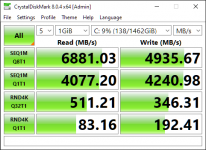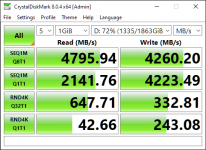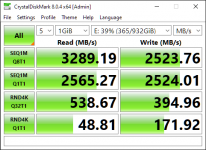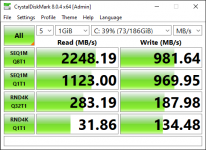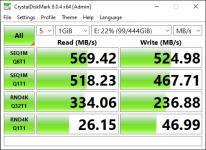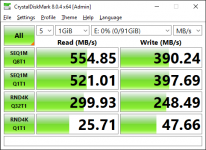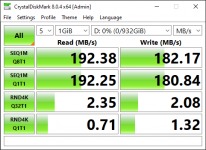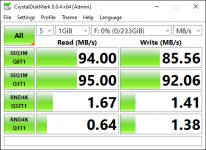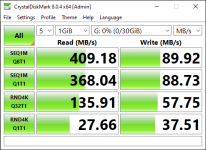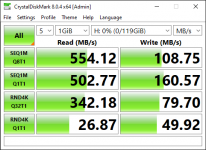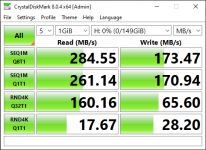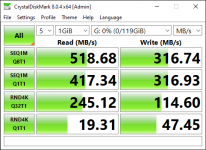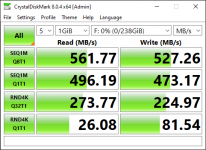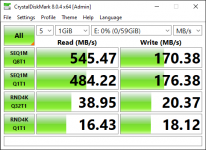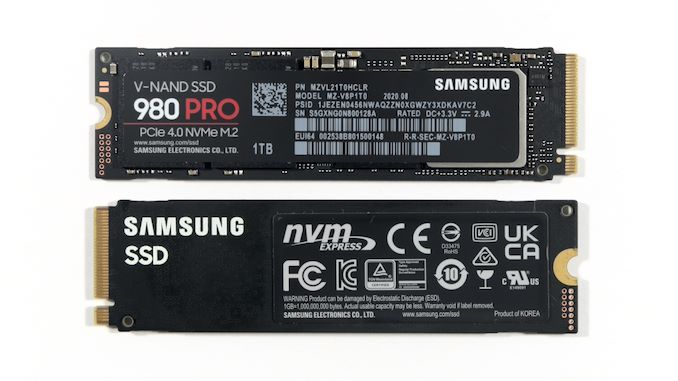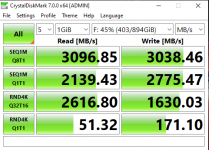Alrighty, I went a little crazy, but I started digging through my spare parts bin and kept finding drives, so I figured, why the hell not test them?
I've attached all the images of the test results for reference, but I have summarized them below:
First by high queue depth sequential speeds:
Drive | Type | Seq (Q8T1) | Seq (Q1T1) | Rnd 4k (Q32T1) | Rnd 4K (Q1T1) |
Samsung 980 Pro 2TB | NVMe 4x Gen4 TLC | 6881.03 | 4077.2 | 511.21 | 83.16 |
Sabrent Rocket 4.0 2TB | NVMe 4x Gen4 TLC | 4795.94 | 2141.76 | 647.71 | 42.66 |
Samsung 970 EVO 1TB | NVMe 4x Gen3 MLC | 3289.19 | 2565.27 | 538.67 | 48.81 |
Intel SSD750 400GB | NVMe 4x Gen3 MLC | 2248.19 | 1123 | 283.19 | 31.86 |
Samsung 850 Pro 512GB | 6Gb/s SATA MLC | 569.42 | 518.23 | 334.06 | 26.15 |
Samsung 870 EVO 250GB | 6Gb/s SATA TLC | 569.08 | 500.43 | 329.72 | 31.65 |
Samsung OEM CM817a 256GB | 6Gb/s SATA TLC? | 561.77 | 496.19 | 273.77 | 26.08 |
Samsung 840 Pro 128GB | 6Gb/s SATA MLC | 554.85 | 521.01 | 299.93 | 25.71 |
Samsung 850 Pro 128GB | 6Gb/s SATA MLC | 554.12 | 502.77 | 342.18 | 26.87 |
Samsung 840 EVO 120GB | 6Gb/s SATA TLC | 553.94 | 488.64 | 286.13 | 25.32 |
Sandisk 64GB | 6Gb/s SATA MLC | 545.47 | 484.22 | 38.95 | 16.43 |
OCZ Vector 256GB | 6Gb/s SATA MLC | 531 | 453.33 | 318.75 | 23.24 |
Samsung OEM PM830 128GB | 6Gb/s SATA MLC? | 518.68 | 417.34 | 245.12 | 19.31 |
Intel S3700 100GB | 6Gb/s SATA MLC | 499.52 | 451.67 | 305.99 | 26.21 |
ADATA SP600 32GB | 6Gb/s SATA MLC | 409.18 | 368.04 | 135.91 | 27.66 |
Intel 320 160GB | 3Gb/s SATA MLC | 284.55 | 261.14 | 160.16 | 17.67 |
WD Blue 1TB WD10EZEX | 6Gb/s SATA 7200rpm | 192.38 | 192.25 | 2.35 | 0.71 |
WD Green 3TB WD30EZRX | 6Gb/s SATA 5400rpm | 132.13 | 130.04 | 1.87 | 0.57 |
WD Blue 250GB WD2500AAJS | 3Gb/s SATA 7200rpm | 94 | 95 | 1.67 | 0.64 |
And second by low queue depth random 4k reads:
Drive | Type | Seq (Q8T1) | Seq (Q1T1) | Rnd 4k (Q32T1) | Rnd 4K (Q1T1) |
Samsung 980 Pro 2TB | NVMe 4x Gen4 TLC | 6881.03 | 4077.2 | 511.21 | 83.16 |
Samsung 970 EVO 1TB | NVMe 4x Gen3 MLC | 3289.19 | 2565.27 | 538.67 | 48.81 |
Sabrent Rocket 4.0 2TB | NVMe 4x Gen4 TLC | 4795.94 | 2141.76 | 647.71 | 42.66 |
Intel SSD750 400GB | NVMe 4x Gen3 MLC | 2248.19 | 1123 | 283.19 | 31.86 |
Samsung 870 EVO 250GB | 6Gb/s SATA TLC | 569.08 | 500.43 | 329.72 | 31.65 |
ADATA SP600 32GB | 6Gb/s SATA MLC | 409.18 | 368.04 | 135.91 | 27.66 |
Samsung 850 Pro 128GB | 6Gb/s SATA MLC | 554.12 | 502.77 | 342.18 | 26.87 |
Intel S3700 100GB | 6Gb/s SATA MLC | 499.52 | 451.67 | 305.99 | 26.21 |
Samsung 850 Pro 512GB | 6Gb/s SATA MLC | 569.42 | 518.23 | 334.06 | 26.15 |
Samsung OEM CM817a 256GB | 6Gb/s SATA TLC? | 561.77 | 496.19 | 273.77 | 26.08 |
Samsung 840 Pro 128GB | 6Gb/s SATA MLC | 554.85 | 521.01 | 299.93 | 25.71 |
Samsung 840 EVO 120GB | 6Gb/s SATA TLC | 553.94 | 488.64 | 286.13 | 25.32 |
OCZ Vector 256GB | 6Gb/s SATA MLC | 531 | 453.33 | 318.75 | 23.24 |
Samsung OEM PM830 128GB | 6Gb/s SATA MLC? | 518.68 | 417.34 | 245.12 | 19.31 |
Intel 320 160GB | 3Gb/s SATA MLC | 284.55 | 261.14 | 160.16 | 17.67 |
Sandisk 64GB | 6Gb/s SATA MLC | 545.47 | 484.22 | 38.95 | 16.43 |
WD Blue 1TB WD10EZEX | 6Gb/s SATA 7200rpm | 192.38 | 192.25 | 2.35 | 0.71 |
WD Blue 250GB WD2500AAJS | 3Gb/s SATA 7200rpm | 94 | 95 | 1.67 | 0.64 |
WD Green 3TB WD30EZRX | 6Gb/s SATA 5400rpm | 132.13 | 130.04 | 1.87 | 0.57 |
Surprisingly strong showing from the little 32GB Adata drive

Probably best to ignore the write speeds on all of these. They are old, anywhere from mostly untouched to partially or mostly used up write cycles, and I didn't run trim on them in advance.
Generally in client loads, low QD is what matters as you are usually running fewer things at the same time. In servers (like with databases and stuff) high queue depth is generally more important.
Sequential is important for copying large files from one place to another. Random 4k is more important for pretty much everything else.
While I am tempted to say that RND4K Q1T1 are the numbers to look at, I guess I could be persuaded to compromise and use the RND4K Q32T1 figures.
Either way, the random data best matches at least my subjective experience with drives, and completely explains why the shift from hard drives to SATA drives was
revolutionary for system resposiveness and load times, while every advancement since has been mostly evolutionary. Because if you look at it, the slowest random 4k SSD on the list is 23x faster when it comes to RND4K Q1T1, but the slowest sequential SSD on the list is only about 48% faster than the fastest sequential hard drive on the list.

